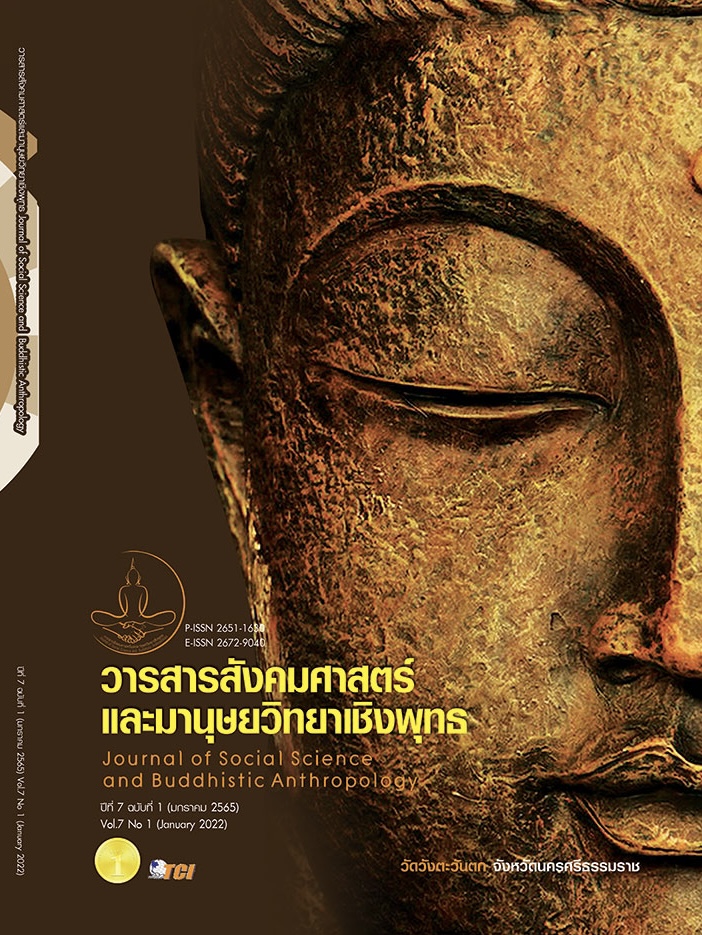SITUATIONS PROBLEMS, NEEDS, AND GUIDELINES IN PHYSICAL EDUCATION LEARNING MANAGEMENT MODEL ON RHYTHMIC ACTIVITIES APPLYING PHENOMENON-BASED LEARNING APPROACH
Keywords:
Physical Education Learning Management, Rhythmic Activities, Phenomenon - Based - Learning Management, 21st - Century SkillsAbstract
The Objectives of this research were to investigate problem condition, needs, and guidelines in the physical education learning management model on rhythmic activities applying a phenomenon-based learning approach for secondary education. This study is qualitative research collecting data from 1) the interview of 8 teachers who have taught physical education, social studies, arts, and English subjects and a group discussion of 20 students enrolled in the rhythmic activities course from two secondary schools. This study further explores the problems and needs of physical education instruction in case of rhythmic activities integrated with social studies, arts, and English subjects using analytic induction and comparative analysis; 2) the interview of 5 experts using content analysis. The findings show that 1) the problems encompass the lack of objectives identifying the real-world applications and the 21st - century skills development, the lack of integration in terms of content and learning activities with other subjects, the shortage of learning materials for reviewing the steps, the inability to explain the content of rhythmic activities, the differences of the skills amongst the dancing partners, and the irresponsibility of task submission. 2) Needs include the identification of clear, measurable learning objectives pertinent to the 21st - century skills, the integration with other learning areas, the increase of practice time, explaining the understanding of societal contexts, gender, and learning differences, the accessibility of video clips for further study, and the collaborative assessment of the teachers and students focusing mainly on dancing skills and the 21st - century skills. 3) Guidelines for the learning management should focus on the conceptualization of the key competencies, the implementation of the learning activities integrated with contents on physical education, social studies, arts, and English subjects, the emphasis on the knowledge applicability, the usage of easily accessible learning materials, and on the collaborative assessment between learners and teachers.
References
กลุ่มพัฒนาการศึกษา สำหรับผู้มีความสามารถพิเศษ สำนักวิชาการและมาตรฐานการศึกษา. (2562). โครงการฝึกอบรมและสัมมนาการจัดการเรียนการสอนวิทยาศาสตร์ สำหรับผู้มีความสามารถพิเศษทางด้านวิทยาศาสตร์และคณิตศาสตร์ ณ University of Helsinki ประเทศฟินแลนด์ ระหว่างวันที่ 13 - 20 มีนาคม 2562. เรียกใช้เมื่อ 3
พฤศจิกายน 2564 จาก https://www.obec.go.th/wp-content/uploads/ 2019/06/Finland-%E0%B8%AA%E0%B8%A7%E0%B8%81.pdf.
กุลิสรา จิตรชณาวาณิช. (2562). การจัดการเรียนรู้. กรุงเทพมหานคร: จุฬาลงกรณ์มหาวิทยาลัย.
ชลาธิป สมาหิโต. (2562). การจัดประสบการณ์การเรียนรู้โดยใช้ใช้ปรากฏการณ์เป็นฐานสำหรับเด็กประถมวัย. วารสารมหาวิทยาลัยศิลปากร, 39(1), 113-129.
ถนอมขวัญ ทองโปร่ง และคณะ. (2563). การศึกษาสภาพปัญหาการใช้นวัตกรรมการจัดการเรียนการสอนของอาจารย์โรงเรียนสาธิตมหาวิทยาลัยรามคำแหง ฝ่ายมัธยม. วารสารศิลปการจัดการ, 4(1), 124-139.
ภัทรกวี กันทรมงคล และจันทร์สุดา การดี. (2560). สภาพการใช้สื่อการสอนของวิทยาลัยการเมืองการปกครอง มหาวิทยาลัยมหาสารคาม. วารสารการเมืองการปกครอง, 7(1), 449-460.
ภารดี ศรีลัด. (2559). หนังสือเรียนพลศึกษา. กรุงเทพมหานคร: บริษัท ไซเบอร์พริ้นท์กรุ๊ป จำกัด.
ราชกิจจานุเบกษา. (2561). ยุทธศาสตร์ชาติ 20 ปี (พ.ศ. 2561 - 2580). เรียกใช้เมื่อ 3 กันยายน 2564 จาก http://www.ratchakitcha.soc.go.th/DATA/PDF/ 2561/ A/082/T_ 0001.PDF
ฤทธิไกร ไชยงาม และคณะ. (2561). ปัญหาและแนวทางการแก้ไขเพื่อพัฒนาทักษะผู้เรียนภาษาอังกฤษของชุมชนเรียนรู้ทางวิชาชีพครูผู้สอนภาษาอังกฤษในสังกัดองค์การบริหารส่วนจังหวัดขอนแก่น. วารสารศึกษาศาสตร์ มหาวิทยาลัย มหาสารคาม, 12(2), 7-17.
สถาบันส่งเสริมการสอนวิทยาศาสตร์และเทคโนโลยี กระทรวงศึกษาธิการ. (2559). สรุปผลการวิจัย PISA 2015. เรียกใช้เมื่อ 3 กันยายน 2564 จาก http://www.oic.go.th/ FILEWEB/CABINFOCENTER6/DRAWER056/GENERAL/DATA0000/00000070. PDF
สริน ประดู่ และคณะ. (2562). สภาพปัญหาการวัดและประเมินผลการเรียนรู้วิชาพลศึกษาของโรงเรียนสาธิต สังกัดสำนักงานคณะกรรมการการอุดมศึกษา. วารสารครุศาสตร์จุฬาลงกรณ์มหาวิทยาลัย, 47(1), 474-486.
อมรรัตน์ เตชะนอก และคณะ. (2563). การจัดการศึกษาในศตวรรษที่ 21. วารสารมหาจุฬานาครทรรศน์, 7(9), 1-15.
อรพรรณ บุตรกตัญญู. (2561). การเรียนรู้โดยใช้ปรากฏการณ์เป็นฐานเพื่อสร้างมุมมองแบบองค์รวมและการเข้าถึงโลกแห่งความจริงของผู้เรียน. วารสารครุศาสตร์ จุฬาลงกรณ์มหาวิทยาลัย, 46(2), 348-365.
อัจศรา ประเสริฐสิน และคณะ. (2560). การศึกษาแนวทางการจัดการนวัตกรรมทางการศึกษาไปใช้ในการพัฒนาการเรียนการสอนและการทำวิจัย. วารสารบรรณศาสตร์ มศว, 10(2), 78-89.
Coopersmith. S. (1984). SEI: Self-esteem Inventories. California: Psychologist Press Inc.
EduCluster Finland. (2017). Phenomenon - Based Learning - Developing Teacher Competences. Retrieved September 4, 2021, from http://educlusterfinland.fi/
Karlsson, P. (2016). Finding Leverage in Supporting Upper Comprehensive School Teachers with Phenomenon-Based Learning and Co-Design. Retrieved fromhttps://aaltodoc.aalto.fi/bitstream/handle/123456789/27182/master_Karlsson_Paula_2017.pdf?sequence=1.
Symeonidis, V. & Schwarz, J. F. (2020). Phenomenon-Based Teaching and Learning through the Pedagogical Lenses of Phenomenology: The Recent Curriculum Reform in Finland. Retrieved September 4, 2021, from http://www.edite.eu/ wp-content/uploads/2017/11/ Phenomenon-based-teaching-and-learning-through-the-pedagogical-
World Economic Forum. (2018). The Global Competitiveness Report 2017–2018. Retrieved September 4, 2021, from www.weforum.org/docs/GCR20172018 /05FullReport/TheGlobalCompetitivenessReport%E2%80%932018.pdf
Downloads
Published
How to Cite
Issue
Section
License
Copyright (c) 2022 Journal of Social Science and Buddhistic Anthropology

This work is licensed under a Creative Commons Attribution-NonCommercial-NoDerivatives 4.0 International License.









